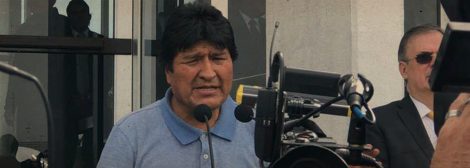The Bolivian President who was ousted in a coup d´état last weekend, landed at Mexico City Airport at 11:09 after several South American countries prohibited the Mexican plane from flying through their airspace.
“It has been a journey through a variety of places and political decisions,” said Mexican Foreign Minister Marcelo Ebrard. The instruction was for an Air Force airplane to fly to Bolivia to get Evo Morales, but several complications arose including the plane’s arrival in Peru, receipt of the permit from Bolivia for the plane to leave Peru and land in Bolivia, Ecuador´s prohibition for the plane to fly over its airspace, which meant the trip lasted almost an entire day.
“It was a journey through Latin American politics, how decisions are made and the risks the region is facing”, added Ebrard according to RT news outlet [1].
On landing and thus beginning his political asylum, Morales spoke to the press. In addition to thanking the Mexican Foreign Affairs Minister for saving his life, the Bolivian leader highlighted that he decided to resign “so that no more blood is shed”. He revealed that on November 9, when arriving to Cochabamba to protect himself from the violent persecution he was facing, “a member of the Army showed me messages and calls putting a $50,000 price on my head. This was a day before our resignation.”
“It´s important to be alive, this allows us to continue fighting with the Bolivian people. (…) This is another lesson that will strengthen the struggle of the people,” said Evo Morales.
The leader also confirmed that, “after the electoral victory on October 20, a coup d´état began” and he regretted that, “the national police joined the coup in the end.”
Morales denounced the attack on his house and those of other authorities, and the harassment suffered by many people including racist and xenophobic attacks. He also thanked the neighbours and activists who protected him.
“If I’m guilty of any crime, it is being indigenous; if I’ve committed a sin, it is implementing social programs for the poor, that work towards justice and equality. Peace will be possible when social justice is ensured.”
“Is it a crime or sin to be ideologically anti-imperialist?” He questioned. “This coup will not make me change my ideology, it won’t change the fact that I work with the poorest sectors. We have reduced extreme poverty. This is one more lesson that will strengthen the struggle of the peoples.”
He concluded saying, “I’d like to say to the social movements and activists, whether workers, peasants or ministers who as of last night have not resigned, ‘my brothers and sisters of the Pact of Dignity [the native indigenous peasant movement], my comrades from the Tropic of Cochabamba, who protected me to the very end: we are here, safe and sound, thanks to Mexico and Mexican authorities. But I would also like to say to you, brothers and sisters: as long as I´m living, I will continue in politics. The struggle continues. And we know for a fact that the peoples around the world have the right to break free.”
Tension and uncertainty
On Tuesday afternoon, El Alto inhabitants marched to La Paz demanding the respect for the Whipala and for peace. They are waiting to see if an Assembly is established to create a coalition and transition government. In turn, the Bolivian Central Union called for the re-establishment of constitutional order within 24 hours. If this doesn’t happen, they will start an indefinite general strike with a mobilization in La Paz city, according to ALBA TV.
